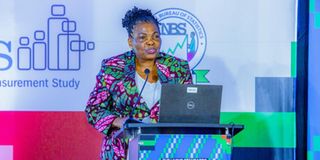Tanzania’s statistics master plan receives $82 million boost

Director General of Tanzania National Bureau of Statistics (NBS), Dr Albina Chuwa speaks during the event. PHOTO | COURTESY
What you need to know:
- The plan, which runs from 2022 to 2027, provides a thorough framework for the national development of official statistics
Dar es Salaam. Tanzania has received a significant boost with an injection of $82 million to implement its Second Tanzania Statistical Master Plan (TSMP II).
The plan, spanning from 2022 to 2027, outlines a comprehensive strategy for the development of official statistics across the country. The TSMP II aims to establish a robust administrative records system in Tanzania, meeting 60 percent of statistical needs through advancements in Information Communication Technology (ICT) and physical infrastructure.
“Human capacity development is also a key focus, reflecting the plan’s commitment to addressing data gaps and improving the quality of statistical information,” said TSMP II Coordinator James Mbongo in a conversation with The Citizen.
The plan comes in response to increased demand for statistical information in recent years, driven by the need to monitor national development plans, regional frameworks, and global agreements, as Mr Mbogo explained.
TSMP II is positioned to rectify shortcomings in the National Statistical System (NSS), such as insufficient coordination, low awareness of statistical use, and low priority given to statistics. Focusing on the three main components of the plan of Harmonisation, Quality, and Dissemination of Data; Data Production; and Infrastructure and Institutional Development underscores its multifaceted approach.
The emphasis is placed on harnessing non-traditional data sources, improving sampling frames, and enhancing statistical infrastructure.
For his part, minister for Finance Mwigulu Nchemba emphasised the importance of collaboration from various stakeholders in a statement, including ministries, departments, agencies, civil society organisations, and the private sector, highlighting their crucial role in the success of TSMP II.
The TSMP II, coordinated by the National Bureau of Statistics (NBS) and the Office of Chief Government Statistician (OCGS), will span five years and be funded by government development partners. With an initial estimated budget of $384 million, it reflects a commitment to modernising statistical systems and meeting the demands of national and global development frameworks.
The NBS director general, Dr Albina Chuwa, explained that the plan will follow a structured governance model, involving committees at various levels and ensuring collaboration across sectors and stakeholders. The plan’s success will be continuously monitored, with regular reports and evaluations to address potential gaps.
“The plan is already in motion; we started with local government authorities, the private sector, and individual researchers.
The fund is also going to build statistics offices in Lindi, Pemba and Simiyu to ensure every part of the country is reached,” said Dr Chuwa.
Dr Chuwa revealed this as the country, in collaboration with the World Bank and other African countries, celebrates 15 years of the Living Standards Measurement Study—Integrated Survey on Agriculture (LSMS-ISA).
The World Bank, in collaboration with NBS and the Office of the Chief Government Statistician Zanzibar (OCGS), has been working on the LSMS project since 2008/09.
This initiative, spanning multiple African nations, has seen the World Bank provide financial support and expertise to facilitate household monitoring research in Tanzania.
“The LSMS project has been instrumental in tracking the well-being of households in the region over the years,” noted Chief Economist for Sub-Saharan Africa at the World Bank, Andrew Dabalen.
In a significant development, 54 international visitors from various African countries, including Malawi, Uganda, Mali, Ethiopia, Burkina Faso, Niger, and Nigeria, descended upon Tanzania.
This gathering marked the culmination of the LSMS project’s phase in Tanzania, where the World Bank’s financial and technical contributions played a pivotal role in realising the household monitoring research.
The collaborative efforts between NBS and OCGS in Zanzibar have yielded noteworthy results.
According to data from the National Statistics Offices, extreme poverty in Tanzania has shown a decline, dropping from 9.7 percent in the Household Income and Expenditure Survey of 2011/12 to a lower 8 percent in 2017/18.
The LSMS project has not only brought international collaboration to Tanzania but has also become a catalyst for positive change in the country’s socio-economic landscape.
The findings from this research contribute valuable insights into the living conditions and economic well-being of households, serving as a foundation for evidence-based policymaking and targeted interventions.
The LSMS project stands as a testament to the positive impact that international collaboration can have on addressing issues of poverty and improving the quality of life for its citizens.
As Tanzania embraces TSMP II, it aligns with global trends of evidence-based policy and decision-making, responding to coordinated regional and global development frameworks.
The plan’s strategic, prioritised, and realistic approach reflects the nation’s commitment to delivering high-quality statistics in the face of ever-expanding data demands.




